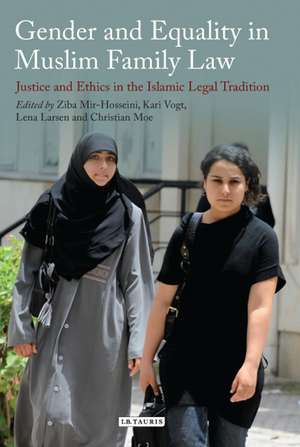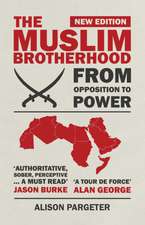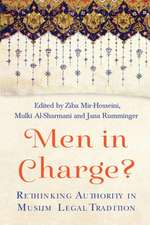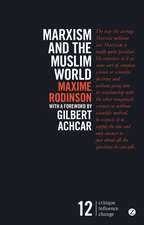Gender and Equality in Muslim Family Law: Justice and Ethics in the Islamic Legal Tradition
Editat de Lena Larsen, Ziba Mir-Hosseini, Christian Moe, Kari Vogten Limba Engleză Paperback – 17 ian 2017
| Toate formatele și edițiile | Preț | Express |
|---|---|---|
| Paperback (1) | 154.08 lei 3-5 săpt. | +38.09 lei 4-10 zile |
| Bloomsbury Publishing – 17 ian 2017 | 154.08 lei 3-5 săpt. | +38.09 lei 4-10 zile |
| Hardback (1) | 348.36 lei 6-8 săpt. | |
| Bloomsbury Publishing – 24 apr 2013 | 348.36 lei 6-8 săpt. |
Preț: 154.08 lei
Preț vechi: 177.35 lei
-13% Nou
Puncte Express: 231
Preț estimativ în valută:
29.49€ • 32.02$ • 24.77£
29.49€ • 32.02$ • 24.77£
Carte disponibilă
Livrare economică 01-15 aprilie
Livrare express 15-21 martie pentru 48.08 lei
Preluare comenzi: 021 569.72.76
Specificații
ISBN-13: 9781784537401
ISBN-10: 1784537403
Pagini: 288
Dimensiuni: 156 x 234 x 25 mm
Greutate: 0.39 kg
Editura: Bloomsbury Publishing
Colecția I.B.Tauris
Locul publicării:London, United Kingdom
ISBN-10: 1784537403
Pagini: 288
Dimensiuni: 156 x 234 x 25 mm
Greutate: 0.39 kg
Editura: Bloomsbury Publishing
Colecția I.B.Tauris
Locul publicării:London, United Kingdom
Notă biografică
Ziba Mir-Hosseini is a legal anthropologist, specializing in Islamic law, gender and development, and a founding member of the Musawah Global Movement for Equality and Justice in the Muslim Family. She has published books on Islamic family law in Iran and Morocco, Iranian clerical discourses on gender, Islamic reformist thinkers, and the revival of zina laws. She has also co-directed two award-winning feature-length documentary films on Iran: Divorce Iranian Style (1998) and Runaway (2001). Kari Vogt is Associate Professor (Emerita) at the Department of Cultural Studies and Oriental Languages at the University of Oslo, Norway. She has published widely on Islamic and Middle East issues.
Cuprins
Introduction: Muslim Family Law and the Question of Equality. Ziba Mir-Hosseini, Kari Vogt, Lena Larsen and Christian Moe1. Justice, Equality and Muslim Family Laws: New Ideas, New Prospects. Ziba Mir-HosseiniPart I: Perspectives on Reality2. Qiw?ma in Egyptian Family Laws: 'Wifely Obedience' between Legal Texts, Courtroom Practices and Realities of Marriages. Mulki Al-Sharmani3. Egyptian Women's Rights NGOs: Personal Status Law Reform between Islamic and International Human Rights Law. Marwa Sharafeldin4. The Religious Arguments in the Debate on the Reform of the Moroccan Family Code. Aïcha El Hajjami5. From Local to Global: Sisters in Islam and the Making of Musawah: A Global Movement for Equality in the Muslim Family. Zainah AnwarPart II: Approaches to Reform6. Gender Equality and the Doctrine of Wilaya. Muhammad Khalid Masud7. The Status of Women between the Qur'an and Fiqh. Nasr Abu-Zayd8. Gender Equality and the Hadith of the Prophet Muhammad: Reinterpreting the Concepts of Mahram and Qiwama. Faqihuddin Abdul Kodir9. Rethinking Men's Authority over Women: Qiwama, Wilaya and their Underlying Assumptions. Hassan Yousefi Eshkevari10. Revisiting Women's Rights in Islam: 'Egalitarian Justice' in Lieu of 'Deserts-based Justice'. Mohsen KadivarPart III: Instead of a Conclusion11. The Paradox of Equality and the Politics of Difference: Gender Equality, Islamic Law and the Modern Muslim State. Anver M. Emon
Recenzii
The book accomplishes its goal by exploring the political and hermeneutical challengesthat hinder gender equality from being fully realized by scrutinizing Islamic texts and jurists' opinions.










